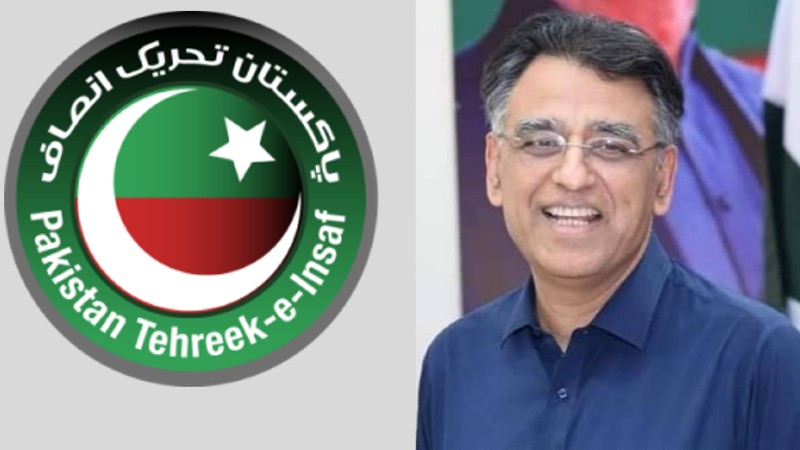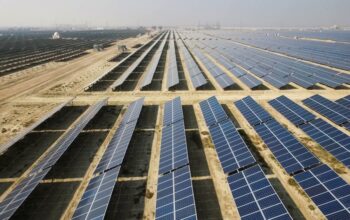The party that rose to power on an anticorruption platform is quite unbothered by allegations of corruption flying all around over its four-year rule.
By Staff Reporter
ISLAMABAD: Unruffled by widespread allegations of rampant corruption surfacing over its four year sojourn in power, former Prime Minister Imran Khan’s Pakistan Tehreek-e-Insaf (PTI) is dead-set on its narrative of political corruption and accountability being central to all ills of our polity.
This is the takeaway from an exclusive interview of PTI Secretary General and economy point man Asad Umar by Independent Pakistan, held at the party’s Islamabad office before Eid Ul Azha.
What is more, the PTI is willing sit together with the other major political forces of the country and to join hands with them over the so called Charter of Economy – if the ruling coalition can put in place a mechanism for across-the-board accountability, he said.
In other words, PTI could risk being seen consorting with those Khan has routinely called thieves and dacoits and refused to shake hands with or sit together with even when necessitated by national security considerations – if only they would allow primacy to his narrative of political corruption.
But it not as if Asad Umar believes such consensus is achievable. “If someone comes from Mars and evolves consensus on an accountability mechanism, then all other issues including increased polarisation can be overcome”, he said.
From Ayub Khan to Imran Khan, Bonapartist generals and their civilian cohorts in Pakistan have made political corruption the central tenet of their narrative, with a view to demonising and discrediting the political class. What is different this time around is that the military has avowedly returned to its constitutional role, renouncing any role in politics.
It is generally known that the tenures of military strongmen or the establishment’s anointed civilian puppets see even more corruption because no one is allowed to ask questions.
Also, democratic governance is widely believed to be a cure for political corruption, precisely because it allows (and even incentivises) people to ask questions. Generally speaking, the more democratic a system of governance, the less corruption there will be.
However, PTI does not seem to be in any mood to allow such thoughts to interfere with its narrative.
“There is no normal politics going on in this country because this is matter of their survival for protecting their ill-gotten money”, said Asad Umar, not holding back on his fiery harangue against corruption.
Asked about bye-elections in Punjab, the PTI stalwart said that it would not be a usual election as it would have a bearing on the election of Chief Minister Punjab. “We are hopeful that the PTI and its allies will have government in Punjab as all surveys are indicating that the PTI is going to win the coming bye polls in the largest province of the country.”
Independent Pakistan is not privy to any such surveys reported in the media.
Asked about the perception that PTI wanted to discredit the mainstream media to promote its own brigade of YouTubers, he said that the world had changed.
“There is traditional media all over the world – including the US, the UK, Pakistan and other countries – that has the power to control and dispense the information”, he said. “Now social media with the help of technology has empowered youths sitting at their homes. The PTI adopted social media from day one and it played significant role in our politics.
“There is no direct relationship that PTI wanted to discredit the mainstream media. There is a division on screen of TVs as well as on Social Media as some are our supporters and some are opposing us. But everyone will have to accept social media as a reality.”
Asked about allegations against his party of fanning polarisation in the society, he said the increased polarisation was not phenomena limited to Pakistan but it was spreading everywhere.
Asad Umar said that if the PTI rose to power again, it would do certain things differently. He said that the PTI leadership had learnt from their past experience and it was an evolutionary process.
He said that next time if they got opportunity for ruling over the country the political aspects would be given more weightage. He said that PM had focused 99 percent on governance during its tenure as at twilight of its government he used to chair on price monitoring committee.
He defended the performance of former principal secretary Azam Khan and said that his strengths were more than his weakness.
To a query about civil service reforms, he said that without ensuring political stability no civil service reforms could be done in Pakistan.
Asad Umar also pushed the (discredited) narrative of a foreign regime change conspiracy.
Asked why the Pakistan Democratic Front (PDM) government had remained unable to strike a deal with the International Monetary Fund (IMF) if it was indeed rose to power with United States help, he replied that the conspiracy might be to install a weak and force it to take decisions which a strong government would never accept.
Talking about the PTI government’s economic performance, Umar said that it achieved the targets and the country’s GDP growth touched 6 percent in the last fiscal year despite experiencing the century’s most dangerous COVID-19 pandemic.
Umar was Minister for Finance, Revenue and Economic Affairs in Imran Khan’s cabinet from August 2018 to mid-April 2019.
Revised data shows Pakistan economy scored a nominal GDP growth rate of 2.5 in fiscal year 2018-2019. Not only was this a precipitous fall from the previous fiscal’s 6.2 percent, it translated to a contraction in real terms after taking population growth into account.
The next year, the country’s economy nominally shrank by -1.3 percent. The growth figure of around 6 percent cited the PTI’s final year in power was calculated from this low base. The nation’s economy is yet to return to the pre-PTI levels.
Asad Umar claimed his government had generated 5.5 million jobs, and he took credit for the country’s record yields in wheat, rice, and maize.
Asked about the bourgeoning twin deficits, he said that the current account deficit increased mainly because of commodities super cycle in international market. Although on the higher side, CAD under the PTI government was lower than under the Pakistan Muslim League-Nawaz (PML-N) government in 2017-18, he claimed.
PTI’s economy wizard claimed the budget deficit escalated in the last three months of the previous fiscal year when the PDM took power and interest rates escalated so debt servicing requirement rose manifold.
He further claimed that the net addition in foreign loan under the PTI led regime was less than during the tenure of PML-N government, and said the debt to GDP ratio had improved under Imran Khan as Pakistan was among few countries where the debt as a percentage of GDP had improved.
The public debt in absolute terms had increased mainly because of hike in interest rates and devaluation of rupee against US dollars, he said, claiming debt to GDP ratio improved.
When asked about tax to GDP ratio which had declined in the aftermath of rebasing of national accounts, the former minister conceded that the tax to GDP ratio dropped mainly because of two factors including massive macroeconomic adjustment was done in the wake of twin deficits.
He said that the country had plunged into technical default because our foreign currency reserves were in negative. The PTI had to undertake massive adjustments so it caused slowing down of the economy. The pace of imports was slashed and the tax collection remained at a standstill.
In the next fiscal, he said the pandemic occurred but last year things normalized and taxes witnessed impressive growth. He said tax to GDP ratio would have gone up if the PTI government had not been ousted.
Imran Khan’s key lieutenant made a point of bending down on the narrative of a foreign conspiracy to oust the PTI-led government.
When his attention was drawn to how the military and intelligence agencies had distanced themselves from the narrative of regime change through a foreign conspiracy, he said that he did not know whether the military establishment was involved in it or not.
But he added in the same breath that if resolution of a murder case inevitably focused on the motive of crime and who benefits from it. In this case, he said, the opposition parties were the beneficiary and corpse of PTI government was also lying there. The weapon, he said, was also found in shape of cypher and involvement of Sindh House.
He said that there were certain aspects of this conspiracy about which the PTI did not know, which is why it demanded establishment of a judicial commission to unearth the whole conspiracy to oust the PTI government from power.
The ISPR also supported the idea of the judicial commission and they would support it, he added.
The military has merely said it has no objection to the political leadership investigating the matter however it pleases. “Whatever commission the government forms, the military will extend full cooperation”, were the words Inter-Services Public Relations (ISPR) chief Maj Gen Babar Iftikhar used recently in a television interview.
Copyright © 2021 Independent Pakistan | All rights reserved




